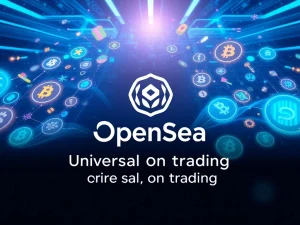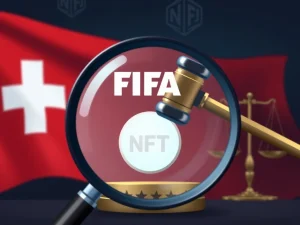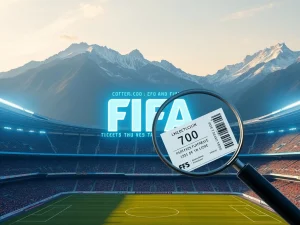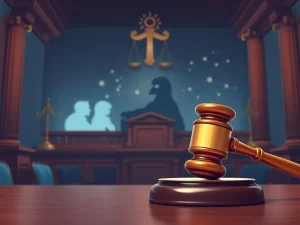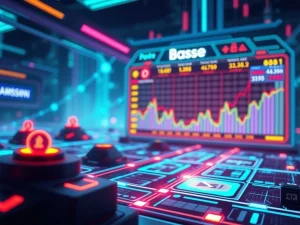Shockwave: Ninth Circuit Reverses $9M Yuga Labs Trademark Award, Reshaping NFT Legal Battleground
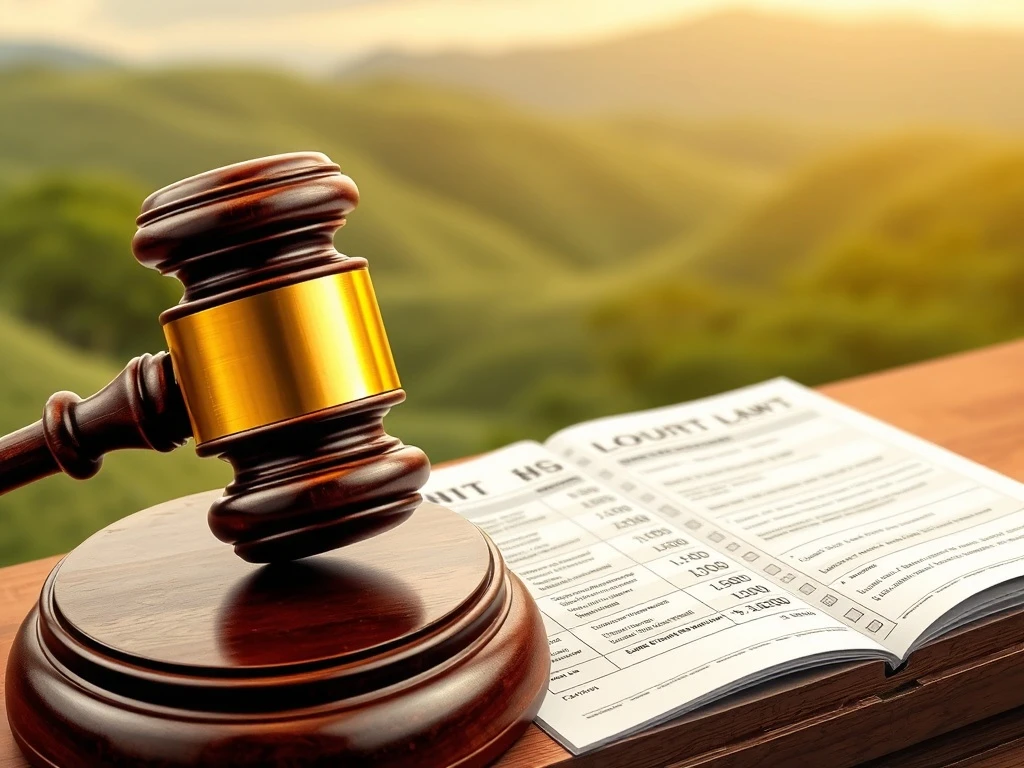
A legal earthquake just shook the NFT world! The US Ninth Circuit Court of Appeals has delivered a stunning blow to Yuga Labs, the creators behind the iconic Bored Ape Yacht Club, by reversing a monumental $9 million trademark infringement award. This isn’t just a minor setback; it’s a pivotal moment that redefines how intellectual property (IP) is protected in the digital asset space, particularly concerning NFT trademark law. For anyone deeply invested in cryptocurrencies and digital art, this ruling underscores the complex dance between traditional legal frameworks and the burgeoning Web3 frontier.
The Stunning Ninth Circuit Reversal: What Just Happened?
On July 3, 2025, the Ninth Circuit Court of Appeals sent shockwaves through the digital art community. The court overturned a previous federal court decision that had awarded Yuga Labs $9 million in damages against artist Ryder Ripps and business partner Jeremy Cahen. Their alleged infringement involved an NFT collection titled “Ryder Ripps Bored Ape Yacht Club,” which Yuga Labs claimed directly copied their highly successful Bored Ape Yacht Club (BAYC) NFTs. The core reason for this reversal? The appellate court found that Yuga Labs failed to adequately demonstrate sufficient evidence of consumer confusion.
This means the lawsuit, which began in 2022, is now heading back to a California federal court for a retrial. The initial ruling in 2023 had favored Yuga Labs, dismissing a counterclaim from Ripps, who argued his work was a satirical critique of what he perceived as racist elements within Yuga’s NFTs. This new development highlights the significant hurdles in applying conventional trademark standards to the nuanced world of digital assets.
NFTs as “Goods”: A Pivotal Moment for NFT Trademark Law
Despite the reversal on damages, the Ninth Circuit’s ruling wasn’t a complete loss for Yuga Labs. Crucially, the appellate panel affirmed that NFTs indeed qualify as “goods” under US trademark law. This judicial recognition is a monumental step forward for the entire digital asset industry.
Here’s why this aspect of the ruling is so significant:
- Empowerment for Creators: This decision empowers NFT creators with a stronger legal basis to pursue infringement claims. It confirms that their digital creations can be protected under existing IP laws, just like physical products.
- Trademark Priority: The court also confirmed Yuga Labs’ trademark priority, acknowledging they were the first to commercially use the Bored Ape Yacht Club marks. This reinforces the idea that establishing early rights is vital in the fast-paced NFT space.
- Setting a Precedent: This part of the ruling sets a clear precedent for future NFT-related litigation, offering a foundational legal principle that NFTs are not merely digital curios but tangible assets capable of bearing trademarks.
While this is a win for the broader concept of NFT trademark protection, it comes with a critical caveat: proving actual market confusion remains a high bar.
The Crux of the Matter: Unpacking “Consumer Confusion” in the Yuga Labs Case
The heart of the Ninth Circuit’s reversal lies in its assessment of consumer confusion. Trademark law is fundamentally designed to prevent consumers from being misled about the source or origin of goods or services. In this case, the appeals court found that the lower court erred in its evaluation of whether Ripps’ NFTs genuinely confused consumers into believing they were official Yuga Labs products or endorsed by them.
Key aspects of the court’s reasoning on this point include:
- Burden of Proof: The onus is on Yuga Labs to demonstrate that consumers were actually, or were likely to be, confused by Ripps’ collection. This requires concrete evidence, not just assumptions.
- Ripps’ Defense: Ripps had argued his NFTs were a satirical commentary. While the court agreed his use didn’t qualify as “nominative fair use” (which allows use of a trademark to refer to the trademarked good itself) and wasn’t protected under the First Amendment as pure artistic expression, it still required Yuga Labs to prove actual marketplace confusion.
- Distinguishing Satire from Infringement: The ruling highlights the fine line courts must walk between protecting intellectual property and allowing for artistic parody or critique. Even if a work isn’t protected as fair use, the plaintiff still needs to prove harm via confusion.
For the upcoming retrial, the focus will be intensely on whether Yuga Labs can provide compelling evidence that buyers of “Ryder Ripps Bored Ape Yacht Club” NFTs were genuinely confused, mistaking them for official Bored Ape Yacht Club products or believing they were endorsed by Yuga Labs.
What’s Next for Bored Ape Yacht Club and the NFT Ecosystem?
The reversal has naturally elicited strong reactions from both sides. Greg Solano, co-founder of Yuga Labs, expressed his intent to “finish the fight in the district court,” viewing the ruling as validation that BAYC NFTs are indeed “protectable trademarks.” This suggests Yuga Labs remains committed to defending its intellectual property vigorously.
On the other hand, Ryder Ripps hailed the decision as a “huge victory for artists who seek to make expressive meaningful work.” This sentiment underscores the ongoing tension between robust intellectual property rights and the freedom of artistic expression and commentary within the digital realm.
For the broader Bored Ape Yacht Club ecosystem and other NFT projects, this case serves as a crucial reminder:
- Brand Vigilance: NFT creators must remain vigilant in protecting their brands, but also understand the high bar for proving infringement.
- Due Diligence for Buyers: For collectors and investors, it emphasizes the importance of due diligence to ensure the authenticity and origin of digital assets.
- Evolving Legal Frameworks: The case illustrates that the legal landscape for NFTs is still nascent and rapidly evolving, requiring adaptability from all participants.
Navigating the Evolving Legal Landscape: Key Takeaways for Yuga Labs and Beyond
The Ninth Circuit‘s decision is more than just a win or loss for specific parties; it’s a landmark moment shaping the future of digital asset law. It clearly signals that courts are grappling with how to apply established legal principles, like trademark law, to novel technologies such as NFTs. This case, involving a high-profile entity like Yuga Labs, will undoubtedly serve as a reference point for countless future disputes.
For creators, investors, and legal professionals in the Web3 space, the key takeaways are clear:
- Evidence is Paramount: Future infringement claims will heavily depend on concrete evidence of actual market confusion. Speculation or broad claims will not suffice.
- Balance is Key: Courts are striving to balance innovation and artistic freedom with the legitimate need for intellectual property protection. This often means nuanced rulings rather than clear-cut victories.
- Proactive IP Strategy: NFT projects should develop robust IP strategies, including clear branding guidelines, proactive monitoring for potential infringements, and understanding the specific legal thresholds they might need to meet in litigation.
This case exemplifies the complexities of applying conventional legal frameworks to emerging technologies. It underscores that while NFTs are recognized as trademarkable goods, the path to enforcing those rights against alleged infringers is fraught with challenges, particularly when artistic expression and satire are involved. The retrial will be closely watched, as its outcome could further refine the legal blueprint for digital ownership and creativity.
Frequently Asked Questions (FAQs)
1. What was the core reason for the Ninth Circuit’s reversal of the Yuga Labs trademark award?
The primary reason for the reversal was that the Ninth Circuit Court of Appeals found Yuga Labs failed to demonstrate sufficient evidence that Ryder Ripps’ NFT collection caused actual consumer confusion with Yuga’s Bored Ape Yacht Club NFTs. The court ruled that the lower court erred in its assessment of this crucial element of trademark infringement.
2. Does this ruling mean NFTs are not trademarkable?
No, quite the opposite. A pivotal aspect of the ruling is the judicial recognition that NFTs *can* be classified as “goods” under US trademark law. The court affirmed Yuga Labs’ trademark priority, meaning NFTs are indeed protectable, but enforcing those rights requires meeting the burden of proving consumer confusion.
3. Who are Yuga Labs, Ryder Ripps, and Jeremy Cahen?
- Yuga Labs: The creator of the highly popular Bored Ape Yacht Club (BAYC) NFT collection, among other prominent NFT projects.
- Ryder Ripps: An artist who created an NFT collection titled “Ryder Ripps Bored Ape Yacht Club,” which Yuga Labs claimed was an infringement. Ripps defended his work as a satirical critique.
- Jeremy Cahen: Ripps’ business partner involved in the creation and distribution of the disputed NFT collection.
4. What is “consumer confusion” in trademark law, and why is it important here?
In trademark law, consumer confusion refers to the likelihood that consumers would mistakenly believe that an infringing product or service comes from, is endorsed by, or is affiliated with the original trademark holder. It’s crucial because trademark law aims to protect consumers from being misled and to safeguard a brand’s reputation. In this case, Yuga Labs needed to prove that consumers were confused into thinking Ripps’ NFTs were official Bored Ape Yacht Club products, which the appeals court found they hadn’t adequately done.
5. What are the implications for other NFT creators and artists?
This ruling sets a significant precedent. For NFT creators, it solidifies the idea that their digital assets can be trademarked, but also emphasizes the high bar for proving infringement, especially when artistic expression or satire is involved. Artists may feel more emboldened to create derivative or critical works, while creators of original collections will need to strengthen their evidence of market confusion in future legal battles.
6. What happens next in the Yuga Labs vs. Ripps case?
The case has been sent back to a California federal court for a retrial. The new trial will primarily focus on whether Yuga Labs can successfully demonstrate that Ripps’ NFTs caused actual consumer confusion, meeting the legal thresholds for trademark infringement and cybersquatting claims.

